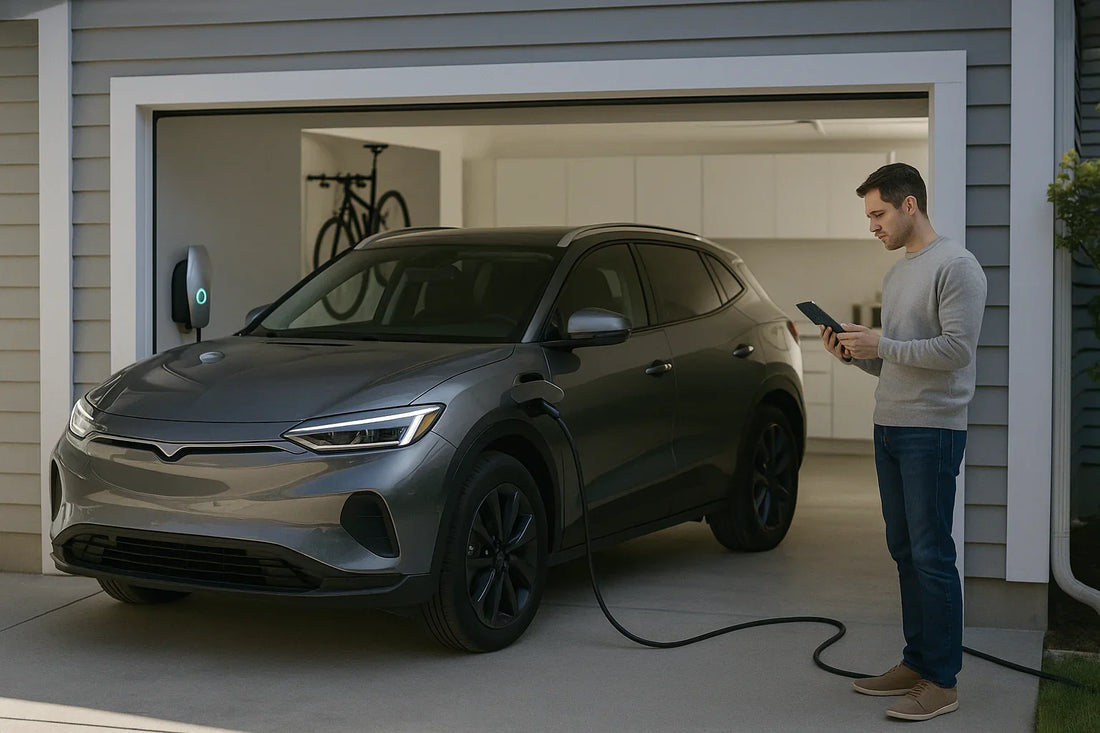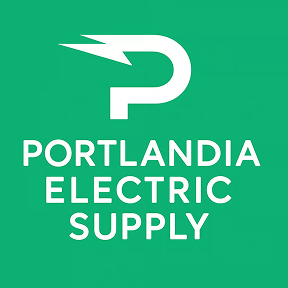
Home EV Charger Benefits & Installation Costs: Is It Worth It?
Share
Home EV Charger Benefits & Installation Pros and Cons
As electric vehicles (EVs) become increasingly popular, understanding the benefits and costs of home EV charger installation is essential for potential EV owners. Having a dedicated charging station at home can offer convenience, cost savings, and potentially increase the value of your property. In this article, we'll explore the types of EV chargers available, compare home and public charging options, and discuss the overall benefits of installing a home EV charger.
Understanding EV Chargers
Types of EV Chargers
EV chargers come in various types, each offering different charging speeds and installation requirements. Level 1 chargers are the most basic, plugging into a standard household power outlet with a current of 10-15 amps. While convenient, they offer slow charging, taking up to 24 hours for a full charge. This type of charger is often included with the purchase of an electric vehicle, eliminating the need for special installation.
| Charger Type | Details |
|---|---|
| Level 2 Chargers | Require a dedicated circuit and professional installation by a licensed electrician. These chargers provide faster charging times, typically taking 3 to 8 hours for a full charge, making them the most popular choice for home installations. |
| Additional Chargers | For those with higher power needs, a 22kW charger requires a three-phase power supply, whereas a 7kW charger is compatible with a standard single-phase connection. While DC Fast Chargers can charge an EV in under an hour, they are typically used for commercial or public charging stations due to their high power demands and cost, making them unsuitable for home use. |
Home EV Charger vs. Public Charging Stations
Opting for a home EV charger instead of depending solely on public charging stations or slower Level 1 chargers offers significant convenience. Installing a Level 2 charger allows you to charge your EV overnight or whenever it's parked at home, eliminating the need for special trips to charging stations. This is not only more convenient but also cheaper than using public charging stations, especially if you're on a time-of-use electricity plan that offers reduced rates during off-peak hours. Public charging can be 3-5 times more expensive than charging at home due to subscription or individual usage fees. Additionally, public charging stations can be crowded, out of order, and a hassle to access, making home charging the more reliable and efficient option.
Benefits of Installing a Home EV Charger
Installing a home EV charger offers numerous advantages that enhance the overall EV ownership experience. One often overlooked benefit is the potential increase in your home's resale value. As EV infrastructure becomes more desirable, a home equipped with an EV charging station can become a more attractive option for future homebuyers, potentially commanding a premium price in the real estate market. Furthermore, investing in a home charging solution ensures your electric car is always ready to go, without the need for detours to public charging stations. Programs like the On-Bill Repayment Program (OBR) make it easier for homeowners to afford this upgrade with no money down, low interest rates, and repayment through cost savings on your electricity bill. With a home EV charger, charging your EV at home becomes a seamless part of your routine, making everyday life more convenient.
Installation Process of an EV Charger
Preparing Your Home for EV Charger Installation
Before you begin the installation of an EV charger at home, it's crucial to properly prepare your home to ensure a smooth process. Start by assessing the installation site and gathering all necessary tools and materials. Safety precautions are paramount for a secure home EV charger setup. Selecting the right location for your EV charger is essential, focusing on the proximity to your electrical panel and parking area to minimize the distance for wiring. If you're mounting it on your garage wall, ensure convenient access for charging your electric vehicle.
| Step | Details |
|---|---|
| Check Amperage Capacity | Most modern EV chargers require a dedicated 240-volt circuit with specific amperage ratings, typically ranging from 40 to 50 amps. |
| Panel Accommodation | Determine if your panel has available space for an additional circuit breaker of sufficient capacity without exceeding its total load. |
If your current panel cannot accommodate the required amperage or lacks space for a new breaker, an upgrade to a larger panel may be necessary.
Steps to Install an EV Charger at Home
To install an electric vehicle charger securely, attach the mounting bracket directly to a stud on the garage wall to ensure stability and safety. For outdoor installations, consider weatherproofing measures to protect the charger from the elements. Run the appropriate electrical cable from the main panel to the charger location; use 8 AWG cable for 32 A or 40 A service, ensuring it's hidden within walls and ceilings or in metal or PVC conduit if exposed. For 48 A service, a thicker 6 AWG cable is necessary. Install a double circuit breaker configuration in two adjacent open slots of your electric service panel. Once the breakers are in place, turn them to the OFF position. Connect the wiring to the new 240 V circuit breaker, ensuring all connections are secure and compliant with electrical codes. Configure the charger settings according to the manufacturer's instructions. Plug the wall station into the 240 V outlet, turn on the double circuit breakers, and perform initial tests to ensure the unit functions correctly, checking for proper power delivery and ensuring there are no faults or errors.
Hiring Professionals vs. DIY Installation
While there are charging stations designed for DIY installation, such as the Lectron V-Box Pro, hiring a qualified electrician is often the best choice, especially if you're not comfortable working with electricity. Should you choose to hire a professional installer, look for a licensed electrician with experience in EV charger installations. Check for certifications and reviews to ensure they are qualified and reliable. This not only guarantees compliance with local codes and regulations but also provides peace of mind that your EV charger at home is installed safely and efficiently. Additionally, professional installation can help avoid potential issues that could arise from improper setup, ensuring your charging station functions optimally.
Costs Associated with EV Charger Installation
Average Installation Costs for Home EV Chargers
According to estimates from Qmerit, the cost to have a charging station installed in the United States ranges from approximately $1,150 to $2,750. This estimate includes the cost of the charger itself, which can range from $350 to $750, and installation expenses, typically between $800 and $2,000. On average, you can expect to pay between $1,000 and $3,000 for installing a charger for electric vehicles at home.
| Type of Charger | Cost Range |
|---|---|
| Basic EV Charger Unit (7kW) | $700 - $1,500 |
| Higher Power EV Charger (22kW) | $1,500 - $3,000 |
Installation costs, including labor and materials, may add $500 to $2,000 to the total. If electrical upgrades are required, these can add an additional $500 to $3,000 to the overall expense.
Factors Influencing Installation Costs
The final cost of installing a home EV charger varies based on several factors, including local labor rates, the charger's power specifications, distance from the electrical panel, and the complexity of the charging station installation, such as the need for permits. Some homeowners may receive higher quotes, even exceeding $5,000 or $10,000 in certain cases, particularly if outdated electrical panels require upgrades to accommodate a new 240-volt circuit. Upgrading to a larger breaker panel can significantly increase project expenses. If the charger is installed far from the main power supply, additional wiring and labor costs may apply. Trenching, wall-mounting, or other modifications could impact the overall price. Smart chargers with Wi-Fi connectivity, energy monitoring, and app control tend to cost more but provide extra convenience. The availability of a 22kW charger depends on whether your home has a three-phase power supply.
Cost Savings of Charging at Home
Charging your EV at home is typically cheaper than using public charging stations, particularly if you're on a time-of-use electricity plan where rates are lower during off-peak hours. Public charging is generally 3-5 times more expensive than home charging due to subscription or individual usage fees. Charging at home allows EV owners to take advantage of lower electricity rates, especially during off-peak hours, which are usually from 9 p.m. to 9 a.m. (overnight), when most drivers charge their vehicles for extended periods. This results in significant cost savings over time, making the investment in a home EV charging station financially beneficial in the long run.
Benefits of Home EV Charging
Convenience of Charging at Home
The convenience of charging your electric vehicle at home cannot be overstated.
Automakers used to provide complimentary Level 1 chargers, highlighting how simple it was to integrate home charging into daily life. With a dedicated EV charging station installed at home, the ultimate convenience is at your fingertips, allowing you to charge your EV at your leisure. This flexibility means you can plug in your car as soon as you return home, seamlessly incorporating charging into your routine and ensuring your vehicle is always ready to go.
Impact on Property Value
Installing an electric vehicle charger at home offers a significant yet often overlooked benefit: increased property value. As electric vehicles become more common, having a pre-installed EV charging station can make your home more attractive to prospective buyers. This feature is becoming increasingly desirable as more people transition to electric cars. Although the initial investment in an EV charger might seem substantial, it can pay off in the long run by enhancing your home's appeal and potentially commanding a higher resale price in the competitive real estate market.
Environmental Benefits of Home EV Charging
Charging your EV at home contributes significantly to environmental sustainability. Electric vehicles are already a step toward a cleaner environment, and utilizing renewable energy sources like solar panels for home charging can further minimize your carbon footprint. By choosing to install an EV charger at home, you are promoting a more sustainable lifestyle and encouraging environmentally-friendly practices. This not only benefits the planet but also aligns with the growing global emphasis on reducing emissions and fostering greener habits.
The Growing Popularity of Electric Vehicles
Trends in Electric Vehicle Adoption
The popularity of electric vehicles is on the rise, with more models hitting the roads each year. This surge in adoption highlights the importance of having a reliable home charging station. As EVs become a common sight, the need for convenient and accessible home charging solutions becomes paramount. With electric vehicles no longer just a futuristic concept, homeowners are increasingly recognizing the value of installing a home EV charger to accommodate this growing trend and ensure their vehicles are always ready for the journey ahead.
Future of Home EV Charger Technology
As manufacturers continue to roll out new and more efficient electric car models, the technology behind home EV chargers is also advancing. Having an EV charger at home will facilitate seamless upgrades to these newer models. Future home charging solutions are expected to offer faster charging times, improved energy efficiency, and smarter integration with home energy systems. This evolution in technology will provide EV owners with enhanced convenience and flexibility, ensuring that their home charging infrastructure remains compatible with the latest advancements in electric vehicle technology.
Incentives for Installing Home EV Chargers
There are various incentives available to encourage homeowners to install a home EV charger. Federal incentives, along with state-specific programs, can significantly offset the installation costs. Additionally, some utilities, particularly those that are members of organizations like Tri-State, may offer rebates for installing an EV charger at home. These financial incentives not only reduce the initial investment required but also promote the adoption of electric vehicles by making home charging more accessible and affordable for a wider range of homeowners.
